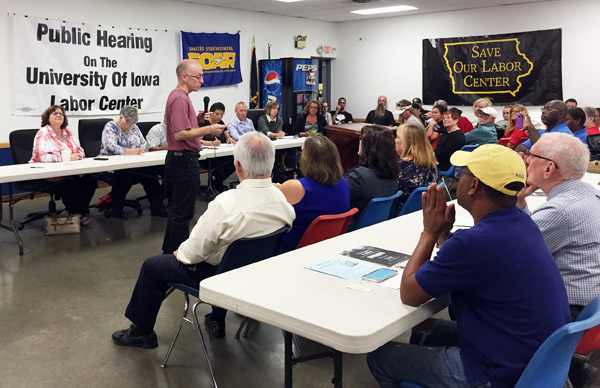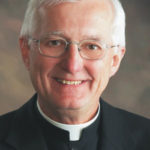By Barb Arland-Fye
The Catholic Messenger
BETTENDORF — A standing-room-only crowd voiced vigorous support for continuation of the University of Iowa Labor Center during a hearing last month in USW Local 105 Hall. Earlier this summer, the university announced the center’s closing, saying that budget cuts by the Iowa Legislature are to blame.
Many labor leaders and workers around the state, including those in attendance at the Bettendorf hearing Aug. 22, believe that politics motivated the decision to diminish rights and advocacy in the workplace. University officials say the decision is based on financial constraints, not politics.

Kent Ferris, Social Action Office director, speaks before a crowd regarding the Iowa Labor Center Aug. 22 in Bettendorf.
Representatives of the Diocese of Davenport’s Social Action Office were among the 100 or more men and women at the Bettendorf hearing. Kent Ferris, the Social Action Office’s director, spoke about church teaching on economic justice. Loxi Hopkins, a volunteer in the Social Action Office, served as a panelist.
Ferris shared excerpts from a statement of the U.S. bishops that calls Catholics to “work for greater economic justice in the face of persistent poverty, growing income gaps, and increasing discussion of economic issues in the United States and around the world.”
He cited principles from the statement, such as: “The economy exists for the person, not the person for the economy; all people have a right to life and to secure the basic necessities of life (e.g., food, clothing, shelter education, health care, safe environment and economic security).”
“Educated people make better employees as well as better citizens,” said speaker Maria Bribriesco, a member of Our Lady of Lourdes Parish in Bettendorf who earned her law degree from the University of Iowa College of Law. “We must not lose sight that public education, especially at higher learning institutions like universities, serves a higher goal of educating people to aspire for a better world and to care about their community.”
Bribriesco, who also serves as Deputy State Director of the League of United Latin American Citizens (LULAC), described the Labor Center as a “bridge between the university and the community of workers.” She said it helps Iowa workers to navigate our country’s complex legal and regulatory scheme. “For example, the Labor Center has provided workshops on wage theft; wage theft is a huge problem in Iowa especially in the restaurant industry. Workers learned how to protect themselves from wage theft and learn the possible remedies available to them.”
Furthermore, “the Labor Center provides a modicum of balance between bosses and employees; between corporations and people. … The common good calls for balance and for the Labor Center to continue to provide services and education to the people.”
Annually, more than 2,500 Iowa workers statewide receive education through the Labor Center on topics such as steward education and contract administration, collective bargaining, economics, labor and employment law, labor public policy issues and leadership development.
Dino Leone, president of the Quad City Federation of Labor, asked for a show of hands of people who had received education through the Labor Center. Raised hands sprang up throughout the room.
“I got my steward’s training at the Labor Center,” Holly Humphrey told the audience when it was her turn to speak. She serves as chief steward of AFGE Local 15 and works as a plans analyst at the Arsenal in Rock Island, Ill. She was able to go to college “because my dad was a well-paid union worker.”
Iowa Rep. Cindy Winckler of Davenport, who serves on the Legislature’s Education Budget Subcommittee, proposed adding a line item to the education budget specifically for the Labor Center. “Then it’s not coming out of the University of Iowa’s general fund but as a stand-alone appropriation and would not require approval by the Board of Regents.”
Hearings about the Labor Center’s closure, to take effect a year from now, have been held throughout the state since July to gather input that “hadn’t been taken by any of the decision makers previously,” said Jen Sherer, the Labor Center’s director. The input will be summarized and presented to the Board of Regents in time for their Sept. 12-13 meeting, Sherer said.
After the Bettendorf meeting, Winckler learned from a colleague that the University of Iowa’s strategic plan calls for centers housed at the university — including the Labor Center — to become more self-sufficient, a message that has been shared more than once, she said. Winckler added that the university is willing to work with the center. “It’s important that we sit down with the University of Iowa and try to negotiate an agreement.”
“We are disappointed to be in this position and did not come to this decision easily,” said Jeneane Beck, the university’s assistant vice president for external relations, Office of Strategic Communication. “President (Bruce) Harreld shared publicly several times that back-to-back state budget cuts by the Iowa Legislature would require difficult decisions, including closing centers and institutes not directly tied to student instruction or student success.”
Beck added, “Over the past 20 years, the state budget has grown by more than $3 billion, but funding for the university has decreased by $9 million. Students once covered about 30 percent of the cost of their education, but the generational disinvestment in public higher education has forced students to now cover more than 60 percent of the cost of their education.
“These centers and employees provide valuable outreach and service to Iowans but we can no longer ask our students to cover the cost of non-student activities previously supported by the state just a generation ago. We believe in the work of the Labor Center and have tried to find a solution, including giving the center a year to find new sources of funding.”











